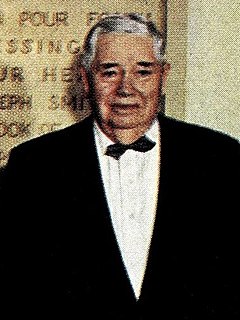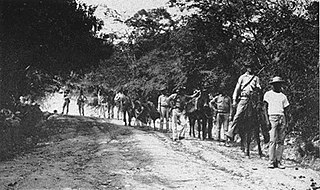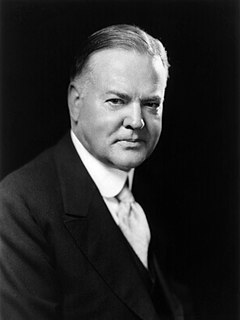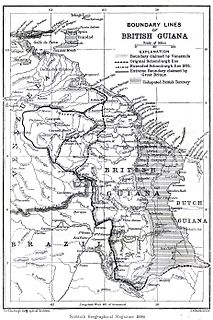The Clark Memorandum on the Monroe Doctrine or Clark Memorandum, written on December 17, 1928 by Calvin Coolidge's undersecretary of state J. Reuben Clark, concerned the United States' use of military force to intervene in Latin American nations. This memorandum was officially released in 1930 by the Herbert Hoover administration.

Calvin Coolidge was an American politician and lawyer who served as the 30th president of the United States from 1923 to 1929. A Republican lawyer from New England, born in Vermont, Coolidge worked his way up the ladder of Massachusetts state politics, eventually becoming governor. His response to the Boston Police Strike of 1919 thrust him into the national spotlight and gave him a reputation as a man of decisive action. The next year, he was elected vice president of the United States, and he succeeded to the presidency upon the sudden death of Warren G. Harding in 1923. Elected in his own right in 1924, he gained a reputation as a small government conservative and also as a man who said very little and had a rather dry sense of humor.

The Deputy Secretary of State of the United States is the principal deputy to the Secretary of State. If the Secretary of State resigns or dies, the Deputy Secretary of State becomes Acting Secretary of State until the President nominates and the Senate confirms a replacement. The position was created in 1972. Prior to July 13, 1972, the Under Secretary of State had been the second ranking officer of the Department of State. The position is held by John J. Sullivan.

Joshua Reuben Clark Jr. was an American attorney, civil servant, and a prominent leader in The Church of Jesus Christ of Latter-day Saints. Born in Grantsville, Utah Territory, Clark was a prominent attorney in the Department of State, and Undersecretary of State for U.S. President Calvin Coolidge. In 1930, Clark was appointed United States Ambassador to Mexico.
Contents
The Clark memorandum rejected the view that the Roosevelt Corollary was based on the Monroe Doctrine. However, it was not a complete repudiation of the Roosevelt Corollary but was rather a statement that any intervention by the U.S. was not sanctioned by the Monroe Doctrine but rather was the right of America as a state. This separated the Roosevelt Corollary from the Monroe Doctrine by noting that the Monroe Doctrine only applied to situations involving European countries. One main point in the Clark Memorandum was to note that the Monroe Doctrine was based on conflicts of interest only between the United States and European nations, rather than between the United States and Latin American nations. [1]

The Roosevelt Corollary was an addition to the Monroe Doctrine articulated by President Theodore Roosevelt in his State of the Union address in 1904 after the Venezuela Crisis of 1902–1903. The corollary states that the United States will intervene in conflicts between the European countries and Latin American countries to enforce legitimate claims of the European powers, rather than having the Europeans press their claims directly.

The Monroe Doctrine was a United States policy of opposing European colonialism in the Americas beginning in 1823. It stated that further efforts by European nations to take control of any independent state in North or South America would be viewed as "the manifestation of an unfriendly disposition toward the United States." At the same time, the doctrine noted that the U.S. would recognize and not interfere with existing European colonies nor meddle in the internal concerns of European countries. The Doctrine was issued on December 2, 1823 at a time when nearly all Latin American colonies of Spain and Portugal had achieved, or were at the point of gaining, independence from the Portuguese and Spanish Empires.
Historian Gene Sessions says the memorandum said the Monroe Doctrine did not explicitly renounce rights of intervention in Latin America (as often stated). It had little if any influence on the development evolution of US Latin American policy. [2]













